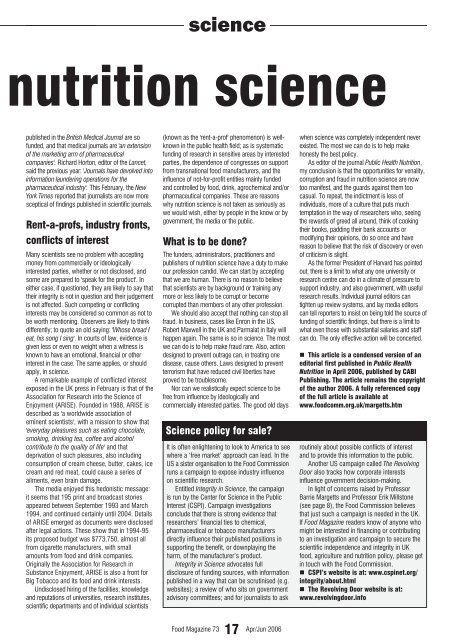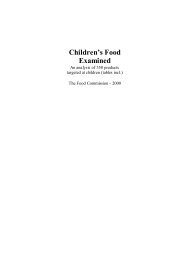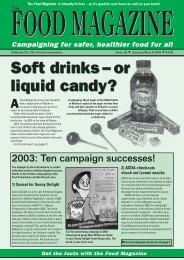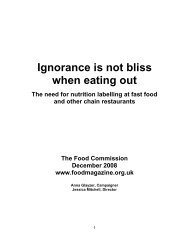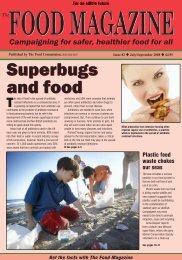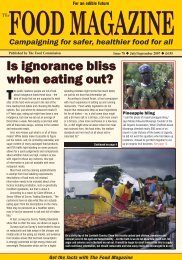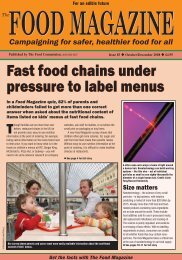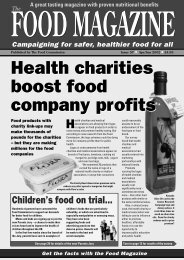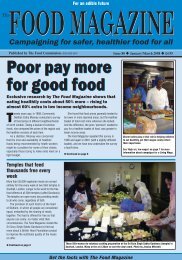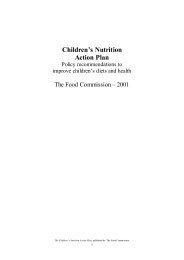Campaigning for safer, healthier food for all - The Food Commission
Campaigning for safer, healthier food for all - The Food Commission
Campaigning for safer, healthier food for all - The Food Commission
Create successful ePaper yourself
Turn your PDF publications into a flip-book with our unique Google optimized e-Paper software.
science<br />
nutrition science<br />
published in the British Medical Journal are so<br />
funded, and that medical journals are 'an extension<br />
of the marketing arm of pharmaceutical<br />
companies'. Richard Horton, editor of the Lancet,<br />
said the previous year: 'Journals have devolved into<br />
in<strong>for</strong>mation laundering operations <strong>for</strong> the<br />
pharmaceutical industry'. This February, the New<br />
York Times reported that journalists are now more<br />
sceptical of findings published in scientific journals.<br />
Rent-a-profs, industry fronts,<br />
conflicts of interest<br />
Many scientists see no problem with accepting<br />
money from commerci<strong>all</strong>y or ideologic<strong>all</strong>y<br />
interested parties, whether or not disclosed, and<br />
some are prepared to 'speak <strong>for</strong> the product'. In<br />
either case, if questioned, they are likely to say that<br />
their integrity is not in question and their judgement<br />
is not affected. Such competing or conflicting<br />
interests may be considered so common as not to<br />
be worth mentioning. Observers are likely to think<br />
differently; to quote an old saying: 'Whose bread I<br />
eat, his song I sing'. In courts of law, evidence is<br />
given less or even no weight when a witness is<br />
known to have an emotional, financial or other<br />
interest in the case. <strong>The</strong> same applies, or should<br />
apply, in science.<br />
A remarkable example of conflicted interest<br />
exposed in the UK press in February is that of the<br />
Association <strong>for</strong> Research into the Science of<br />
Enjoyment (ARISE). Founded in 1988, ARISE is<br />
described as 'a worldwide association of<br />
eminent scientists', with a mission to show that<br />
'everyday pleasures such as eating chocolate,<br />
smoking, drinking tea, coffee and alcohol<br />
contribute to the quality of life' and that<br />
deprivation of such pleasures, also including<br />
consumption of cream cheese, butter, cakes, ice<br />
cream and red meat, could cause a series of<br />
ailments, even brain damage.<br />
<strong>The</strong> media enjoyed this hedonistic message:<br />
it seems that 195 print and broadcast stories<br />
appeared between September 1993 and March<br />
1994, and continued certainly until 2004. Details<br />
of ARISE emerged as documents were disclosed<br />
after legal actions. <strong>The</strong>se show that in 1994-95<br />
its proposed budget was $773,750, almost <strong>all</strong><br />
from cigarette manufacturers, with sm<strong>all</strong><br />
amounts from <strong>food</strong> and drink companies.<br />
Origin<strong>all</strong>y the Association <strong>for</strong> Research in<br />
Substance Enjoyment, ARISE is also a front <strong>for</strong><br />
Big Tobacco and its <strong>food</strong> and drink interests.<br />
Undisclosed hiring of the facilities; knowledge<br />
and reputations of universities, research institutes,<br />
scientific departments and of individual scientists<br />
(known as the 'rent-a-prof' phenomenon) is wellknown<br />
in the public health field; as is systematic<br />
funding of research in sensitive areas by interested<br />
parties, the dependence of congresses on support<br />
from transnational <strong>food</strong> manufacturers, and the<br />
influence of not-<strong>for</strong>-profit entities mainly funded<br />
and controlled by <strong>food</strong>, drink, agrochemical and/or<br />
pharmaceutical companies. <strong>The</strong>se are reasons<br />
why nutrition science is not taken as seriously as<br />
we would wish, either by people in the know or by<br />
government, the media or the public.<br />
What is to be done?<br />
<strong>The</strong> funders, administrators, practitioners and<br />
publishers of nutrition science have a duty to make<br />
our profession candid. We can start by accepting<br />
that we are human. <strong>The</strong>re is no reason to believe<br />
that scientists are by background or training any<br />
more or less likely to be corrupt or become<br />
corrupted than members of any other profession.<br />
We should also accept that nothing can stop <strong>all</strong><br />
fraud. In business, cases like Enron in the US,<br />
Robert Maxwell in the UK and Parmalat in Italy will<br />
happen again. <strong>The</strong> same is so in science. <strong>The</strong> most<br />
we can do is to help make fraud rare. Also, action<br />
designed to prevent outrage can, in treating one<br />
disease, cause others. Laws designed to prevent<br />
terrorism that have reduced civil liberties have<br />
proved to be troublesome.<br />
Nor can we realistic<strong>all</strong>y expect science to be<br />
free from influence by ideologic<strong>all</strong>y and<br />
commerci<strong>all</strong>y interested parties. <strong>The</strong> good old days<br />
Science policy <strong>for</strong> sale?<br />
It is often enlightening to look to America to see<br />
where a ‘free market’ approach can lead. In the<br />
US a sister organisation to the <strong>Food</strong> <strong>Commission</strong><br />
runs a campaign to expose industry influence<br />
on scientific research.<br />
Entitled Integrity in Science, the campaign<br />
is run by the Center <strong>for</strong> Science in the Public<br />
Interest (CSPI). Campaign investigations<br />
conclude that there is strong evidence that<br />
researchers’ financial ties to chemical,<br />
pharmaceutical or tobacco manufacturers<br />
directly influence their published positions in<br />
supporting the benefit, or downplaying the<br />
harm, of the manufacturer’s product.<br />
Integrity in Science advocates full<br />
disclosure of funding sources, with in<strong>for</strong>mation<br />
published in a way that can be scrutinised (e.g.<br />
websites); a review of who sits on government<br />
advisory committees; and <strong>for</strong> journalists to ask<br />
when science was completely independent never<br />
existed. <strong>The</strong> most we can do is to help make<br />
honesty the best policy.<br />
As editor of the journal Public Health Nutrition,<br />
my conclusion is that the opportunities <strong>for</strong> venality,<br />
corruption and fraud in nutrition science are now<br />
too manifest, and the guards against them too<br />
casual. To repeat, the indictment is less of<br />
individuals, more of a culture that puts much<br />
temptation in the way of researchers who, seeing<br />
the rewards of greed <strong>all</strong> around, think of cooking<br />
their books, padding their bank accounts or<br />
modifying their opinions, do so once and have<br />
reason to believe that the risk of discovery or even<br />
of criticism is slight.<br />
As the <strong>for</strong>mer President of Harvard has pointed<br />
out, there is a limit to what any one university or<br />
research centre can do in a climate of pressure to<br />
support industry, and also government, with useful<br />
research results. Individual journal editors can<br />
tighten up review systems, and lay media editors<br />
can tell reporters to insist on being told the source of<br />
funding of scientific findings, but there is a limit to<br />
what even those with substantial salaries and staff<br />
can do. <strong>The</strong> only effective action will be concerted.<br />
This article is a condensed version of an<br />
editorial first published in Public Health<br />
Nutrition in April 2006, published by CABI<br />
Publishing. <strong>The</strong> article remains the copyright<br />
of the author 2006. A fully referenced copy<br />
of the full article is available at<br />
www.<strong>food</strong>comm.org.uk/margetts.htm<br />
routinely about possible conflicts of interest<br />
and to provide this in<strong>for</strong>mation to the public.<br />
Another US campaign c<strong>all</strong>ed <strong>The</strong> Revolving<br />
Door also tracks how corporate interests<br />
influence government decision-making.<br />
In light of concerns raised by Professor<br />
Barrie Margetts and Professor Erik Millstone<br />
(see page 8), the <strong>Food</strong> <strong>Commission</strong> believes<br />
that just such a campaign is needed in the UK.<br />
If <strong>Food</strong> Magazine readers know of anyone who<br />
might be interested in financing or contributing<br />
to an investigation and campaign to secure the<br />
scientific independence and integrity in UK<br />
<strong>food</strong>, agriculture and nutrition policy, please get<br />
in touch with the <strong>Food</strong> <strong>Commission</strong>.<br />
CSPI’s website is at: www.cspinet.org/<br />
integrity/about.html<br />
<strong>The</strong> Revolving Door website is at:<br />
www.revolvingdoor.info<br />
<strong>Food</strong> Magazine 73 17<br />
Apr/Jun 2006


